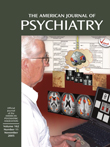Insight and Aggression in Schizophrenia
To the Editor: The research literature on the association between deficits in awareness and aggression in patients diagnosed with schizophrenia is limited; therefore, it was pleasing to read the article by Peter F. Buckley, M.D., and colleagues (1). Their findings highlighted the legal dilemma that mental health experts are faced with in many competency-to-stand-trial evaluations. If a schizophrenic patient who physically assaults another person during a psychotic episode lacks insight into his or her mental illness and does not understand the implications of the violent act, is he or she then mentally fit to be held accountable and to stand trial? The authors briefly discussed this sensitive topic but did not elaborate on an answer.
It is not entirely clear, however, why the authors chose an outpatient population, rather than a forensic or an inpatient population, as the nonviolent control group. The outpatients displayed more insight and less psychopathology than the physically violent patients in a forensic setting (jail or court psychiatric clinic). One might argue, however, that the forensic population displayed symptom profiles similar to those of an institutionalized population because both are involuntarily “locked up” and unable to function in society. The significantly higher scores on the Positive and Negative Syndrome Scale (2) total score in the violent group appear to support this view. Consequently, the insight data might simply be a reflection of the clinical difference between outpatients and institutionalized patients that is unrelated to violent behavior. In other words, an outpatient control group, whether violent or not, would always display higher insight into their mental illness because better awareness is what characterized this group as being able to function in society. In support, the authors reported on the results of Arango et al. (3), who found that lack of awareness predicted violent behavior in inpatients with schizophrenia. The authors, however, did not discuss other studies that have failed to find a relationship between insight and violence in severely mentally ill forensic patients (4), outpatients (5), and inpatients (6). Preliminary analyses of insight data from our inpatient unit at the Nathan Kline Institute for Psychiatric Research–Rockland Psychiatric Center suggest that inpatients with schizophrenia tend to score high on lack of insight—whether violent or not.
1. Buckley PF, Hrouda DR, Friedman L, Noffsinger SG, Resnick PJ, Camlin-Shingler K: Insight and its relationship to violent behavior in patients with schizophrenia. Am J Psychiatry 2004; 161:1712–1714Link, Google Scholar
2. Kay SR, Fiszbein A, Opler LA: The Positive and Negative Syndrome Scale (PANSS) for schizophrenia. Schizophr Bull 1987; 13:261–276Crossref, Medline, Google Scholar
3. Arango C, Calcedo BA, Gonzalez S, Calcedo OA: Violence in inpatients with schizophrenia: a prospective study. Schizophr Bull 1999; 25:493–503Crossref, Medline, Google Scholar
4. Carroll A, Pantelis C, Harvey C: Insight and hopelessness in forensic patients with schizophrenia. Aust NZ J Psychiatry 2004; 38:169–173Crossref, Medline, Google Scholar
5. Yen CF, Yeh ML, Chen CS, Chung HH: Predictive value of insight for suicide, violence, hospitalization, and social adjustment for outpatients with schizophrenia: a prospective study. Compr Psychiatry 2002; 43:443–447Crossref, Medline, Google Scholar
6. Swartz MS, Swanson JW, Hiday VA, Borum R, Wagner HR, Burns BJ: Violence and severe mental illness: the effects of substance abuse and nonadherence to medication. Am J Psychiatry 1998; 155:226–231Abstract, Google Scholar



